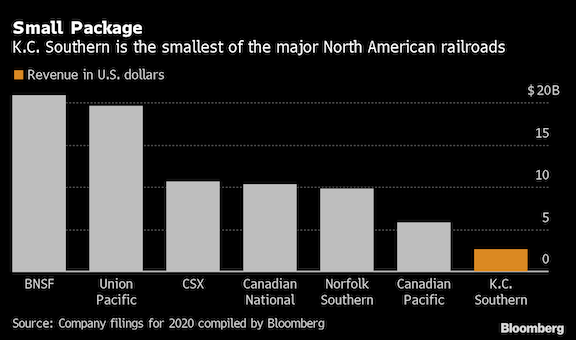Canadian National Railway Co. was dealt a potentially fatal blow in its $30 billion effort to acquire Kansas City Southern as U.S. regulators rejected a plan to use a voting trust to make the purchase.
“Applicants have failed to establish that their use of a voting trust would have public benefits,” the U.S. Surface Transportation Board ruled Tuesday. Using a voting trust “would give rise to potential public interest harms relating to both competition and divestiture.”
The takeover battle will determine which Canadian company will become the first railroad to have tracks through Canada, the U.S. and Mexico. Kansas City Southern gets about half its revenue from Mexico, which is poised for an investment surge as companies seek to shorten supply lines that stretch to Asia.
Canadian National’s shares jumped 5.6% to C$146.02 at 1:57 p.m. in Toronto after climbing 10%, the most intraday since March 2020, to an all-time high. Kansas City Southern dropped 3.2% to $284.29 in New York after tumbling 5%, the most midsession since July 8. Canadian Pacific slid 3.9% to C$87.27, the most intraday since early July.
The STB has already approved Canadian Pacific’s voting trust, which could give it the upper hand as it courts Kansas City Southern. The STB ruling against Canadian National vindicates Canadian Pacific Chief Executive Officer Keith Creel’s decision not to match his rival’s bid in that hope that regulators would reject Canadian National’s trust.
Creel, who said Canadian Pacific didn’t have the financial firepower to win a bidding war, was emboldened after the STB said Canadian National would have to prove that its deal would be in the public interest, a heavy burden adopted in 2001 to quash industry consolidation.
Canadian Pacific had reached a $25 billion deal for Kansas City Southern only to have it snatched away by Canadian National in May. A last ditch $27 billion bid by Canadian Pacific in August was rejected. The U.S. railroad will now have to decide how the STB ruling changes the equation.
Canadian Pacific, the second smallest of the seven major North American railroads, after Kansas City Southern, only has to establish that its tie-up wouldn’t hurt competition—a lesser standard than faced by the larger Canadian National. Noting Canadian Pacific’s lack of overlapping routes with Kansas City Southern, the STB said in April that the Canadian railroad’s proposal “appears to be end-to-end in nature, which likely raises fewer competitive concerns than a transaction that is not end-to-end.”

Canadian National had sought to blunt some of that concern by committing to sell a 70-mile stretch of track that overlapped with Kansas City Southern’s network in Louisiana.
The ruling is a defeat for Canadian National CEO Jean-Jacques Ruest in his effort to leave his smaller national competitor even further behind. The two railroads have waged a century-old rivalry that has included litigation over poaching employees and clients. Ruest and Creel worked together at Canadian National when Creel was its chief operating officer.
Canadian Pacific has been hoping that purchasing Kansas City Southern would narrow a size gap with Canadian National and match its T-shaped network, which spans Canada and drops down through the U.S. to the Gulf of Mexico. Without the acquisition, Canadian Pacific would be isolated in Canada.
Under the terms of its merger agreement with Canadian National, Kansas City Southern can walk away if the regulator rejects the voting trust. In that circumstance, Canadian National would have to pay Kansas City Southern a $1 billion breakup fee. Canadian National may decide to appeal the STB ruling.
A Kansas City Southern merger with Canadian National would create the third largest railroad in North America, leapfrogging Norfolk Southern Corp. and CSX Corp., according to a Bloomberg data analysis of five-year sales trends.





